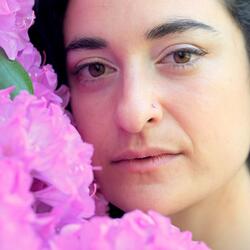 Most mornings, Mia Tabib leaves home in New Haven early. On her way to work in Branford, Conn., she detours to the waterfront, where she strolls and takes in the breeze from Long Island Sound. It’s preparation for the day ahead, which she spends as a licensed clinical social worker treating patients for PTSD and substance abuse. Her patients include violent offenders sent there by the courts and others who have seen trauma in their lives. Despite what they may have done in their lives, Mia seeks their inner gentleness.
Most mornings, Mia Tabib leaves home in New Haven early. On her way to work in Branford, Conn., she detours to the waterfront, where she strolls and takes in the breeze from Long Island Sound. It’s preparation for the day ahead, which she spends as a licensed clinical social worker treating patients for PTSD and substance abuse. Her patients include violent offenders sent there by the courts and others who have seen trauma in their lives. Despite what they may have done in their lives, Mia seeks their inner gentleness.
“I so deeply believe that every human being is inherently good,” she says. “The more I reflect that back to them, the more their internal narrative changes. I see them change in real time the more they reflect on their gentleness.”
Mia has been working in two Branford clinics since graduating in 2020 from a joint YSD/UConn program, with an M.Div. and an M.S.W. Until then she’d held different jobs, working as a Starbucks barista, an editorial intern, a preschool teacher, and a domestic violence counselor. The anchor in her life has been her love of philosophy, her major at the University of Colorado. (When she was young, her father gave her a copy of Plato’s Republic, which led her to other philosophers.) “Social work was the last thing on my radar. I genuinely loved philosophy.”
She came to Yale to continue exploring questions about life. “I wanted a community where I’m able to ask meaningful questions about what it means to be a human being in relation to others and what it means to heal, both individually and in a community.” Her interest in gentleness led professors to suggest the dual-degree program. “I jumped on it when they said there’s this track you can do. It’s everything I want to do with my life.”
Her belief in her patients’ gentleness is the core of her work. “One of the fundamental questions of religion and spirituality is whether humans can change. Biology says we are the products of the neurons in our brains. Philosophy and spirituality say that’s not the whole story. Humans have a spirit, a life force, whatever you want to call that, and there’s a will there. Humans can change.”
—John Curtis